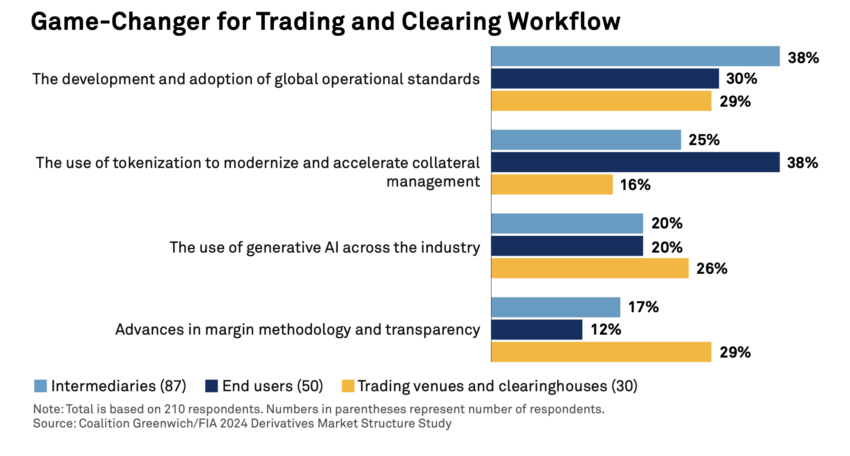Navigating the complexities of the cryptocurrency market and seizing alternatives require a mix of innovation, moral practices, and a deep understanding of distributed ledger know-how (DLT).
As blockchain know-how reshapes the standard finance sector and pioneers the enlargement of decentralized finance (DeFi), staying knowledgeable and adaptable is vital to success. Therefore, the transformative potential of DLT highlights the influence on monetary inclusion, fee effectivity, and the broader financial ecosystem.
The Transfer In the direction of Tokenization
President of Hedera, Charles Adkins, instructed BeInCrypto that blockchain know-how has emerged as a basic power in remodeling transactions, lending, and investments. He attributed the success to the inherent capabilities that allow simultaneous entry, validation, and document updating.
This innovation is especially impactful in cross-border funds, commerce financing, and end-to-end fee transfers.
It permits banking establishments to conduct close to “atomic” worldwide settlements with diminished guide interventions and decrease prices. Certainly, such developments improve fee fashions’ effectivity and prolong monetary companies to beforehand unbanked populations, fostering higher monetary inclusion.
“Blockchain know-how units out to allow particular person collaboration and permit societies to play a component in figuring out the way forward for technological innovation. DLT, as an example, has created new belief layers that allow people, enterprises, and governments to generate collective social influence with out the danger of unhealthy actors buying affect,” Adkins stated.
Learn extra: Deploying Blockchain Infrastructure: Challenges and Options

Distributed Ledger Expertise in Buying and selling. Supply: Coalition Greenwich
DLT is on the forefront of monetary improvements like fractional tokenization, promising to democratize entry to wealth alternatives. Certainly, a current examine performed by Coalition Greenwich revealed that stakeholders within the derivatives sector prioritize the adoption of tokenization. It helps improve collateral administration over implementing generative synthetic intelligence (AI).
In actual fact, for finish customers, tokenization emerged as essentially the most vital potential innovation in buying and selling and clearing workflows.
“Many giant asset managers are engaged on tasks to check the potential for utilizing [tokenization] to maneuver money and securities extra effectively. From their perspective, the transformation of monetary property into tokens and the usage of distributed ledgers to handle transfers might result in a considerable discount in time and expense,” analyst on the Coalition Greenwich wrote.
For that reason, Adkins envisions a future the place DeFi and conventional finance applied sciences converge, enhancing the monetary system for establishments and people.
Blockchain Past Monetary Markets
DLT’s potential extends past monetary markets to deal with urgent points like local weather change and greenwashing. By enabling correct monitoring and reporting of carbon emissions, DLT empowers organizations to optimize their processes, align with environmental requirements, and supply transparency to shoppers and policymakers.
Nevertheless, constructing belief and understanding between builders, policymakers, and the general public is essential to realize this. Dedication to schooling, crypto advocacy, and collaboration amongst Web3 tasks exemplify the efforts to make sure safety and transparency throughout private and non-private sectors.
“DLT performs a significant position in stopping greenwashing makes an attempt by organizations, a problem that has grown in relevance resulting from difficulties in verifying if firms are adhering to sustainability objectives. As a result of knowledge is publicly out there on the distributed ledger, organizations can’t falsify their carbon footprint or make unbacked claims about their sustainability efforts,” Adkins emphasised.
One notable mission, as mentioned in a examine by the College of Copenhagen, includes the usage of blockchain know-how to create an in depth and clear document of firms’ carbon footprints. This mission, named REALISTIC, permits for the exact documentation of products’ CO2 emissions all through their manufacturing and provide chain processes.
The implementation of such know-how aids firms in complying with new EU laws that mandates the reporting of carbon footprints. It additionally paves the best way for shoppers to confirm the environmental influence of their purchases by QR codes.
“[With a pen, for instance] we don’t know the equal carbon affiliation which every of its components… So while you’re seeking to procure the assorted components of the pen you’ll know precisely weigh which half comes from the place, and perceive the influence when it comes to carbon [footprint],” Chief Income Officer at SAP Sustainability Deb Kaplan stated.
Learn extra: Prime 9 Eco-Pleasant Cryptocurrencies To Make investments In
The Local weather Ledger Initiative (CLI) is one other key participant. It focuses on the mixing of digital improvements like blockchain, the Web of Issues (IoT), and synthetic intelligence for local weather change mitigation and adaptation. The CLI helps varied use circumstances and supplies a platform for testing digital improvements in real-life eventualities. Subsequently, it emphasizes the position of DLT in scaling carbon markets and enhancing their environmental integrity.
Adkins believes the mixing of DLT with AI is poised to sort out misinformation and knowledge integrity challenges. As blockchain know-how matures, He anticipates its mainstream adoption, unlocking societal and financial advantages, particularly in asset administration and past.
“DLT will enable builders to deal with challenges with low-quality, biased, and unverified knowledge, offering data-sharing infrastructures which can be open to all researchers and builders, and making certain transparency at each level of the AI knowledge enter course of,” Adkins concluded.
Staying forward within the markets requires an unwavering dedication to innovation, moral governance, and neighborhood engagement. By embracing the ideas of DLT, people and establishments can guarantee a confidence and integrity within the digital age.






